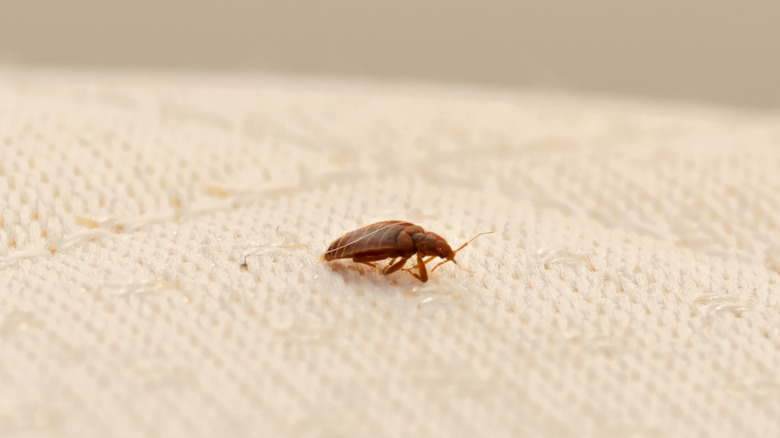Myths About Killing Bed Bugs That Just Don't Work
Most of us have a creepy crawly we actively despise. For some, it might be cockroaches; for others, it is earwigs; still, many react badly to mosquitoes and yellow jackets. But few insects are as universally feared and despised as bed bugs, with some studies showing that most people who have lived with a bed bug infestation at some point suffer from a form of PTSD, per The Atlantic. In one survey, 29% of those who discovered bed bug bites ended up with insomnia, 22% were beset with emotional distress, and 20% said the bugs had caused them anxiety. As University of Montreal researcher Stéphane Perron said, "If you have bed bugs, and if you don't care, that's not a normal reaction. You should be worried. I would consider it a normal reaction to a stressor."
Small wonder, then, that those of us who have woken up to find evidence of bed bug bites are prepared to do what it takes to deal with an infestation. Unfortunately, for every method that works, there are a few that don't. Here are a few myths that don't make your situation any better.
Myth: Chemical warfare alone can stop a bed bug infestation
While some of us might be inclined to reach for a can of bug spray at the first sign of a bed bug infestation, know that whatever chemical you go for isn't likely to work effectively against your unwanted houseguest on its own. Thanks to the overuse of certain pesticides, the United States Environmental Protection Agency says your bed bug might even be resistant to the agent you are looking to use. Scientific American points out that most bed bugs had become resistant to DDT by the time it was banned in 1972. This is similar to how bugs are developing resistance to pyrethroids, a class of pesticide used today.
And even though they may be handy, ABC Home and Commercial Services also discourage the use of everyday cleaning materials, including rubbing alcohol, cleaners, and mothballs. They don't work, with studies showing that the bugs had very high survival rates when exposed to these cleaning agents. Another thing that Consumer Reports says is not likely to work — homemade cayenne pepper sprays since nothing you make at home is strong enough to stop the insect in its tracks.
Myth: Extreme cold can kill bed bugs
While it may be true that bed bugs are naturally attracted to body warmth, per Romney Pest Control, that doesn't mean the pests thrive in the heat and survive the cold. As the University of Nebraska Lincoln (UNL) points out, bed bugs are physiologically built to survive colder temperatures. The University of Minnesota's Stephen Kells states it takes about four days to eradicate bed bugs at 0 degrees Fahrenheit. Kells discourages relying on a winter cold snap to sort out a bed bug problem. UNL says you can kill bed bugs using a cold treatment like cryonite, which involves frozen carbon dioxide on mattresses and hard-to-reach areas.
Professional pest control experts like the Bed Bug Specialist also use targeted hot, dry steam, which exposes infested areas to 356 degrees Fahrenheit. This can kill all bed bugs, from eggs to adults, in seconds. A bed bug infestation may make us desperate enough to do what it takes. Still, Jeff Zimmerman, CEO of bed bug extermination company Prevsol, says there is a need to be clear about what's needed to fight this pest because "Understanding the truth behind common bed bug myths is half the battle. It's important to dispel these myths so that others understand the signs of bed bug infestation and how to appropriately treat them," per Insider.


